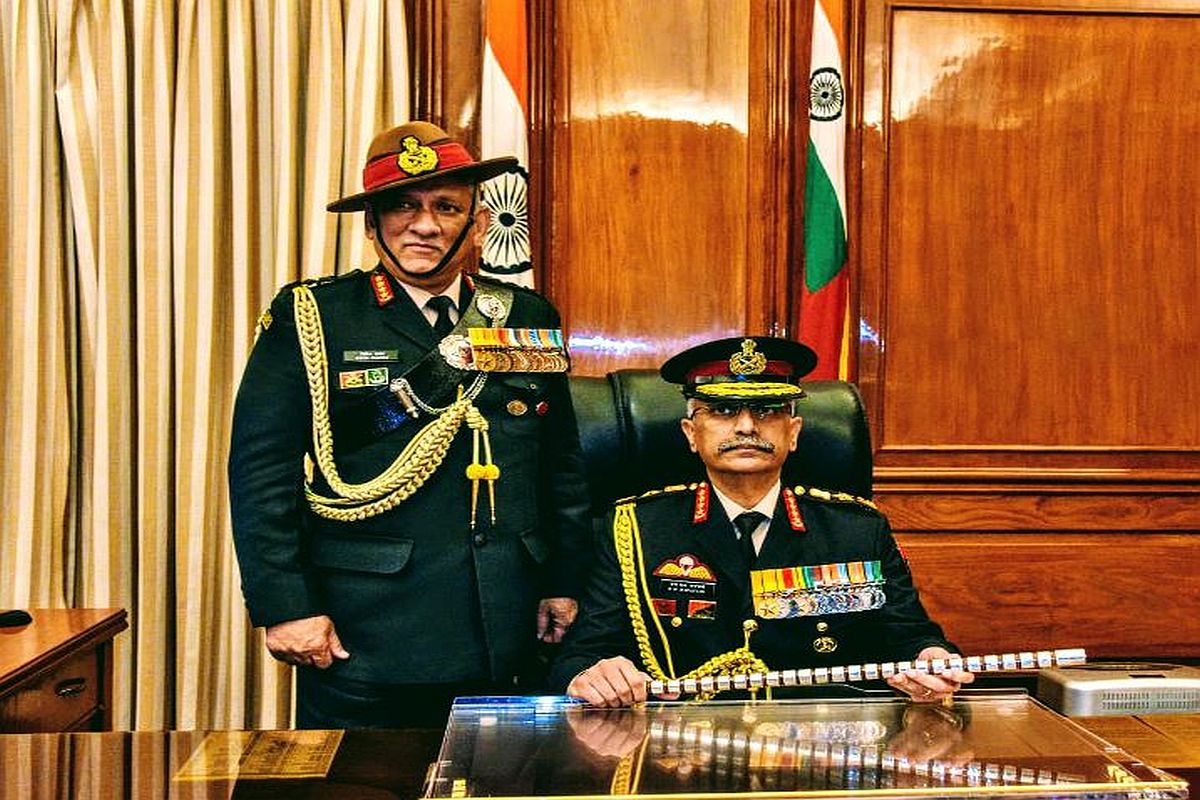Cutting-edge defence tech of army on full display at Republic Day Parade
These technological advancements reflect India's strides in self-reliance under the ‘Make in India’ initiative.
General Naravane has served in numerous command and staff appointments in peace, field and highly active counter-insurgency environments in Jammu and Kashmir and the northeast in his 37 years of service.

CDS General Bipin Rawat with new Army chief General Manoj Mukund Naravane. (Photo: Twitter | @adgpi)
General Manoj Mukund Naravane on Tuesday took over as the 28th Chief of Army Staff, succeeding General Bipin Rawat.
General Rawat handed over the baton of the Chairman of Chiefs of Staff Committee to his successor.
Advertisement
Incumbent General Bipin Rawat demitted office today on retirement from service and took over as the country’s first Chief of Defence Staff.
Advertisement
After receiving his Guard of Honour as the Army Chief at South Block, Rawat wished a successful inning to General Manoj Naravane.
“I am confident he (General Naravane) will take Army to greater heights,” Rawat had said in his address.
जनरल मनोज मुकुंद नरवणे, पीवीएसएम, एवीएसएम, एसएम, वीएसएम, एडीसी ने सेनाध्यक्ष #COAS का पदभार संभाला।#राष्ट्र #सर्वोपरि
General Manoj Mukund Naravane, PVSM, AVSM, SM, VSM, ADC takes over as the Chief of Army Staff #COAS of the #IndianArmy#NationFirst pic.twitter.com/bBEyNQohDi
— ADG PI – INDIAN ARMY (@adgpi) December 31, 2019
The senior-most Army officer after Rawat, Naravane was commissioned into the Sikh Light Infantry Regiment in June 1980.
He has served in numerous command and staff appointments in peace, field and highly active counter-insurgency environments in Jammu and Kashmir and the northeast in his 37 years of service.
A part of the Indian Peace Keeping Force in Sri Lanka, he has also commanded a Rashtriya Rifles Battalion in Jammu and Kashmir and was awarded the Sena Medal (Distinguished Service).
Naravane had also served as defence attache at the Indian Embassy in Myanmar for three years.
He is also a recipient of the ‘Vishisht Seva Medal’ for his services as the Inspector General Assam Rifles (North) in Nagaland and the ‘Ati Vishisht Seva Medal’ for commanding of a prestigious strike corps.
He had assumed charge as Vice Chief of the 1.3 million-strong Army on September 1. Prior to this, Naravane was heading the Army’s Eastern Command, that takes care of India’s nearly 4,000-km border with China.
With Gen Naravane taking charge, all the three services heads, including Navy Chief Admiral Karambir Singh and Indian Air Force Chief RKS Bhadauria, are now from the 56th course of the National Defence Academy.
As the Army chief, Gen Naravane’s priorities are expected to be to implement long-pending reforms of the Army, contain cross-border terrorism in Kashmir and bolster the operational capabilities of the force along the northern border where China has been ramping up its military infrastructure in Tibet.
(With agency inputs)
Advertisement